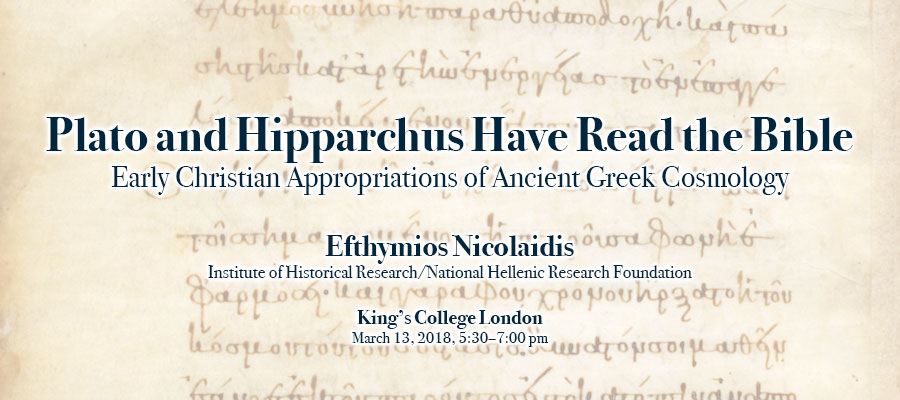Plato and Hipparchus Have Read the Bible: Early Christian Appropriations of Ancient Greek Cosmology, lecture by Efthymios Nicolaidis (Institute of Historical Research/National Hellenic Research Foundation), King’s College London, March 13, 2018, 5:30–7:00 pm
Inspired by the efforts of Philo of Alexandria to convince Greek philosophers that the worldview of the Bible was valid, during the period from the third to the sixth centuries a number of Christian writers made attempts to interpret Genesis and other Holy texts in a way to render them compatible with current philosophical views. These early attempts were based on philosophical interpretations of the Genesis and other Holy texts, following the Greek natural philosophy and astronomy these Christian writers were taught. Towards the end of the fourth century, Basil of Caesarea had laid by his Hexaemeron the foundations of the Christian conception of nature. While based on current philosophical knowledge, his affirmations were incisive, for “the truth is one”, and it does not like contradiction. His brother Gregory of Nyssa returned to several of Basil’s theses, which, when he found them in contradiction with the scientific knowledge of the era, he put them on the right path of natural philosophy. Although the importance of these two fathers, during the next two centuries their views were challenged by other Christian theologians who attacked the conception that Greek natural philosophy and astronomy should be taken into account in order to interpret the Creation. According to their views, Christians must not rely on pagan knowledge to understand God’s will. One attempt to solve the problem was made in the sixth century by John Philopponus who, in his Hexaemeron wrote a chapter affirming that Plato’s and Hipparchus’ astronomy were valid because the two philosophers had read the Bible and so they were inspired by God’s words. In our Lecture we will present these first attempts of reconciliation between philosophy and Christian theology, which defined the relations between science and faith during the Byzantine era.
Efthymios Nicolaidis is Director of Research, History, Philosophy and Didactics of Science and Technology Programme of the Institute of Historical Research/National Hellenic Research Foundation. Born in Athens, Dr. Nicolaidis studied physics and history of science in France. His main publications focus on the relations between science and religion, the history of science in Byzantium and the Ottoman Empire, and the spread of Modern European science. His is the author of Science and Eastern Orthodoxy: From the Greek Fathers to the Age of Globalization (Johns Hopkins University Press, 2011). He is the coordinator of the project Science and Orthodoxy around the World and the current president of the International Union for the History and Philosophy of Science.
Lecture will be followed by the launch of Greek Medical Literature and its Readers: From Hippocrates to Islam and Byzantium, edited by Petros Bouras-Vallianatos and Sophia Xenophontos.
Discussants: Michael Trapp (King’s College London) and William MacLehose (University College London)
